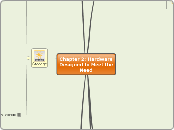por B121F CC 14 anos atrás
1266
Chapter 2
This chapter delves into the various components and standards that define modern computer hardware, focusing on input, output, and storage devices, along with expansion capabilities.

por B121F CC 14 anos atrás
1266

Mais informações
Also known as IEEE 1394 or iLink
Firewire 800
New Firewire standard
Firewire 400
About the same speed as USB 2.0
USB 3.0
New USB standard and it is about 10 times faster than USB 2.0
USB 2.0
Most popular today, up to 480 Gb/s
USB 1.1
USB 1.0
An output device allows you to observe the results of computer processing with one or more of your senses.
An input device assists in capturing and entering raw data into the computer system.
used to store data more permanently without the need for electricity.
Solid state storage devices store data using
transistors. Also store the data without the need for electricity.
USB Flash Drives
Also known as USB thumb drive
Convenient, portable, high-capacity storage
Flash memory card
Keeps its memory when the power is shut down
Uses optical laser to burn pits into the surface of
a highly reflective disk
Blu-laser Disk
Able to read smaller pits, which allows for greater
capacity
DVD
Digital video disk read-only memory(DVD-ROM): stores over 4.7GB of data
CD
Compact disk read-only memory(CD-ROM): Optical media that stores up to 700 MB of data.
Magnetic storage devices use the magnetic properties of iron oxide particles to store bits and bytes more permanently than RAM.
Microdrives
Tiny hard drives that store data on a small disk
High-capacity Disks & Floppy Disks (outdated)
Portable, low-capacity, direct storage medium (out-dated)
Magnetic Tape
Hard Disk Drives
System storage is storage that is used by a computer system for standard operations.
- Semi-permanent storage for information that may
change
- Able to keep accurate time and date even when
computer is shut down
Read-only memory (ROM) Provides permanent storage for data and instructions.
non-volatile
Graphics memory, sometimes called video RAM or VRAM, is used to store image data for a computer display in order to speed the processing and display of video images.
RAM stands for Random Access Memory.
Also known as memory or primary (main) storage.
random access
Random access (sometimes called direct access) is the ability to access an arbitrary element of a sequence in equal time. The opposite is sequential access, where a remote element takes longer time to access.
volatile
requires power to maintain the stored information
Primary circuit board of a computing device. CPU, system storage, system bus are on the motherboard.
The system bus connects the CPU to the chipset, and through it to RAM and other components on the motherboard.
Random access memory(RAM). Temporary, or volatile, memory that stores bytes of data and program instructions for the processor to access.
Central processing unit(CPU), it is a group of integrated circuits that perform processing.
Machine Cycle
store
execute
decode
fetch
CPU performance factors
Key Terms
Millions of instructions per second (MIPS)
Amount of time it takes to execute an instruction
Floating-point operations per second (FLOPS)
-More precise than MIPS
-Gigaflop, teraflop
System clock
Produces a series of electronic pulses at a
predetermined rate called clock speed
Front Side Bus
FSB is now replaced by QPI (QuickPath Interconnect) in Core i CPU.
Architecture
Wordlength
Number of bits that a CPU can process at once
Cache memory
High-speed memory a processor can access more
quickly than RAM
Processor numbers
Used to market processors instead of clock speed
Clock speed
Measured in megahertz (MHz) or gigahertz (GHz)
Key components
L1 (and L2) cache
Recent CPU contains L1 and L2 cache.
Registers
Registers hold the bytes currently being
processed.
Control Unit
The control unit sequentially accesses and decodes program instructions, decodes them, and coordinates flow of data in and out of ALU.
ALU
Arithmetic/logic unit (ALU), it contains the circuitry to carry out instructions, such as mathematical and logical operations.
Integrated Circuit
also called chips. It is used to store and process bits and bytes in today's computers.
Transistor
Composed of semiconducting material that opens or
closes a circuit.
Storage is the ability to maintain data within the
system permanently or temporarily.
also known as CPU
Digital convergence is the trend to merge multiple digital services into one device.
American Standard Code for Information
Interchange(ASCII). Code representing keyboard text characters
Eight bits is a byte – the standard grouping in digital electronics.
Bits aren’t really 1’s and 0’s, they are devices that can be set to one of two states.